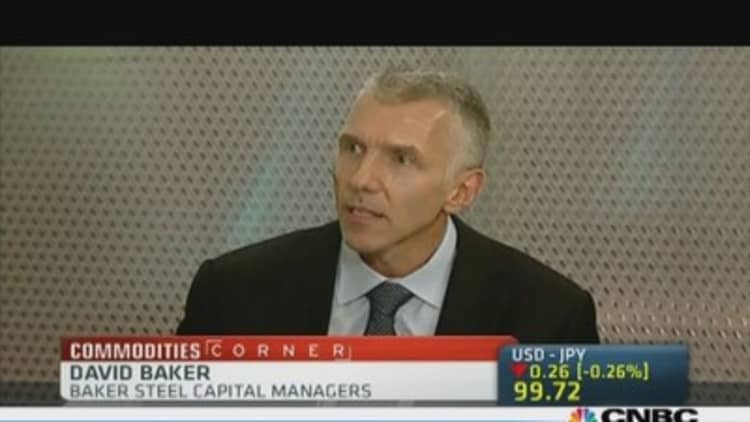Gold prices may strengthen this week supported by Federal Reserve chair nominee Janet Yellen's defense of the bank's current stimulus policy and as outflows in major exchange-traded funds show signs of stabilizing, CNBC's latest poll of strategists, analysts and traders shows.
But physical demand – which remains subdued in top buyer India due to government-imposed import limits – may keep a lid on prices, the survey showed.
Yellen at her Senate confirmation hearings last week defended the U.S. central bank's stimulus to spur growth and said efforts to boost hiring were an "imperative," reinforcing investors' expectations that U.S. monetary stimulus may be in place for an extended period, Reuters reported.
(Read more: After getting crushed, this sector could be golden)
"Yellen has confirmed what some of us have suspected – that stimulus will continue for some time to come," said Gaurav Sodhi, Resources Analyst at Intelligent Investor. "Gold prices have not yet adjusted to this view and I'm bullish."
Stimulative U.S. monetary policy tends to cheapen the dollar, making gold more affordable for buyers paying in other currencies.

Spot gold prices fell over 1 percent Monday, snapping a three-day rise and trading at $1,273.66 an ounce in Asia. The metal has tumbled by over 20 percent this year. December gold futures settled $15.10 an ounce lower on Monday at $1,272.30, with trading volume about 40 percent below its 250-day average, preliminary Reuters data showed.
"Gold's slide has slowed down and support at $1,265-70 has held," said Jonathan Barratt, CEO of Barratt's Bulletin commodity newsletter in Sydney. "We have opened a position at $1,284 with a stop below $1,260." The trading position is a "low-risk" opportunity given "we feel that 'Yellenomics' will allow for a weaker U.S. dollar. We are looking for $1,300 over the next week," Barratt said.
(Read more: Gold demand slumps as Indian consumption shrinks)
CNBC's latest survey of market sentiment showed 50 percent (10 out of 20 respondents) expect prices to gain this week, 20 percent (4 out of 20) predict price declines while a higher-than-average 30 percent (6 out of 20) believe prices will trade around current ranges.
'Insatiable' Appetite
Asia's physical demand profile is uneven, analysts said, with Indian consumption remaining constrained by government-imposed import restrictions while purchases from China look set to surpass India, currently the world's top buyer.
"China's physical demand for gold is strong," said Sean Hyman, Editor of Moneynews at Ultimate Wealth Report. "Why buy so much gold if it's going lower? Obviously, they think it's a good deal here."
Gold demand fell 21 percent in the third quarter as outflows from physical bullion funds and a drop in Indian buying offset firmer jewelry, coin and bar sales, the World Gold Council's latest Gold Demand Trends report showed last week.
(Read more: Gold extends gains as Yellen calms stimulus tapering fears)
"Asian consumer demand is likely to continue to run on only one engine – China," said UBS strategist Giovanni Staunovo. "India's demand should remain depressed, and we doubt that Chinese gold buying can increase further without another round of price weakness."
Flows into gold-backed exchange-traded funds will be critical in determining the near-term outlook for gold. Major ETF's like the SPDR Gold Shares, the world's largest gold-backed fund, have witnessed outflows of nearly 700 tons this year. According to the World Gold Council, overall investment demand fell 56 percent to 185.5 tons in the third quarter, with bullion-backed exchange-traded funds selling 118.7 tons of gold though many believe the selling has now run its course.
"While ETF outflows have subsided recently and somewhat stabilized, ETFs still hold a substantial amount of physical gold," said Edmund Moy, Chief Strategist at Morgan Gold and a former director of the U.S. Mint. "Until there is bad news about the economy, a spike in inflation, or a big change in QE, I think ETFs will be in this holding pattern."
Though there's "no doubt" that ETF selling has slowed, physical demand – shifting from West to East – is picking up much of the slack led by China, argued Scott Carter, the chief executive officer of Los Angeles-based Lear Capital.
(Read more: India forced to take its eyes off gold)
"China's ever-rising demand more than compensated for India's government-aided decline," carter said. China's "insatiable" appetite for gold, wealth building and low metal prices are "set to make them the worlds' largest gold market," Carter said, adding official sector gold purchases are also strong.
"Central banks are still on a gold buying binge and that trend should persist as emerging nations continue to prop up their gold reserves and Russia continues to expand its holdings," he said.
From a technical perspective, if gold hold between $1,260 and $1,280, then it could provide a springboard to retest the $1,330 area and possibly recapture upper resistance $1,350, said Matt Fanning, CIO and Fund Manager at Fanvestments in Providence, Rhode Island.
"Helping the technicals, S&P 500 is at all-time highs, and if there is some profit-taking or any type of sell-off in equities, we could see some rotation into metals," Fanning said.
The gold market will be watching the week's scheduled U.S. data releases – which include CPI inflation, Existing Home Sales and retail sales on Wednesday amongst the highlights – for taper implications and what it means for bullion.
(Read more: Gold falls as equities rebound, physical demand dips)
"The potential for a government shutdown induced miss on retail sales…set the scene for some counter-trend corrections" in the gold price this week, said Ric Spooner, chief market analyst for CMC Markets in Sydney.
U.S. data releases are likely to be "mixed with overall slight improvement," said Morgan Gold's Moy, but the economic activity won't be strong enough "to cause the Fed to start its tapering program before Yellen takes the helm of the Fed."
— By CNBC's Sri Jegarajah. Follow him on Twitter @cnbcSri


